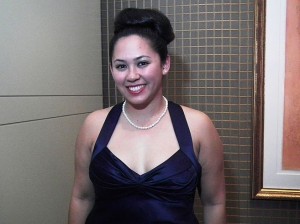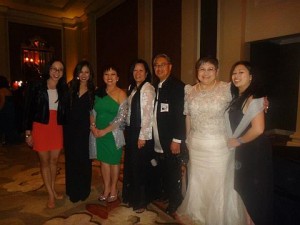WASHINGTON, DC—Among the nearly one million people at President Barack H. Obama’s inauguration on January 21 were many Filipino Americans who came to see a historic event, the installation of America’s first African-American president for a second term.
They also saw the Democratic president, who won his reelection with a convincing majority, pledge to defend Americans’ social safety net and uphold civil rights in the next four years. Pundits described the president’s speech as an assertion of a bold liberal vision.
Obama exhorted Americans to help him preserve social security, Medicare and other social services against efforts diminish the role of government in guaranteeing the public’s wellbeing.
Union man Rudy Gonzalves is ready to lend him a hand. Among the hundreds of thousands that braved the bright but wintry day, the 42-year-old Gonzalves flew in from Los Angeles for the occasion.
“It is important for everyone to continue supporting him and the progressive aims he campaigned on,” he says. A member of the Service Employees International Union Local 71, Gonzalves says there is “a window of opportunity for good changes in immigration and pro-labor policies.”
Gonzalves says he “enjoys being around people who are happy for him and his family and the country.” He adds, “It’s good to be around strangers who are supporting him and know that the nation has an opportunity to make things better—the whole vibe in this city is amazing.”

Marissa Sunio, a 25 year old civil litigation attorney from Orange County, California, at the Asian American Gala
Sheila Napala, a 60-year-old teacher from Falls Church, Virginia felt lucky to get into the inaugural ticketed standing area. She also attended the 2009 inauguration but was pretty far away in the back. “I just have to be here,” she says. “When I see a woman get elected, definitely I’ll be there and wouldn’t mind paying a lot of money for the opportunity to see that inaugural.”
What would she like to see in the next four years? “I want to see is that the Dream Act go through.” The bill would offer undocumented students a path to US citizenship.
“I see so much promise in these students from Guatemala, Mexico, Bolivia, parts of Africa,” Napala says. “I’ve been a teacher for about 20 years. They have really come along way learning our culture and I really feel bad that they have to go back and be deported because they are undocumented.”
Napala says she had three students from the same Bolivian family, who were raised by a single mother. They have all gone through college, one is now a doctor, another is studying to become a doctor and the last one wants to become a physical therapist. But one undocumented and may have to go back to Bolivia soon.
”I’m just hoping that since Obama got the second term that he just doesn’t ride it out, that he follow through about the deficit, health care and gun control,” she adds.
Another Obama well-wisher was 28-year-old Filipino Australian Carlo Velayo, a graduate student doing research at the Library of Congress and Smithsonian. Velayo, who looked forward to “being part of history,” would like to see Obama build on recent victories for gay and lesbian rights.
“As a recently out person, I am extremely interested in how that space grows, how marriage equality would look like in the next four years,” he says.
The Sunday evening before Inauguration Day, many Filipino Americans were among the giddy celebrants at the Asian Pacific American Pearl Inaugural Gala.
Marissa Sunio, a 25-year-old civil litigation attorney from Orange County, California, says she missed the first inauguration in 2009. “It’s a very exciting time because America is making history again by re-electing the first African American president. The energy is great everyone is here for one common purpose.”
Sunio, too, is “really hoping for immigration reform–being an Asian American and Latina I know that will affect both my communities a lot.”
Meanwhile, Theo Gonzalves, a professor and the department chair of American Studies at University of Maryland, Baltimore County, savored the “historical irony” that a new monument of Martin Luther King Jr., the first monument to black American to be placed at the National Mall, will be staring across the tidal basin towards the Thomas Jefferson Memorial
“A slave master and author of the Declaration of Independence now has the man who led a mass-based social movement staring back at him—and 2013 also marks the 150thanniversary of the Emancipation Proclamation that legally ended slavery,” Gonzalves observes.
He notes that there are unfulfilled promises that not only go back four years with Obama, “but hundreds of years in what freedom really means for this country.” Dr. King, he says, was really taking about social justice for the majority of the people.”


